Crypto World
Vatican Bank makes first foray into equity indexes, setting stage for potential ETF launches

Gabriel Bouys | AFP | Getty Images
The Vatican Bank Tuesday launched two equity indexes tracking stocks that align with Catholic values. Its first foray into thematic investment products sets the bank up to potentially roll out other financial products, including ETFs in the future.
The bank, which reports to the Committee of Cardinals and the Pope, said Tuesday in a statement that the Morningstar IOR Eurozone Catholic Principles Index and the Morningstar IOR U.S. Catholic Principles Index include 50 medium and large-cap firms deemed to be consistent with Catholic ethical criteria, including prioritizing human bonds and social justice.
“Having benchmarks built in accordance with recognized Catholic ethical criteria allows us to make our performance assessment and reporting processes even more rigorous and transparent,” Giovanni Boscia, Vatican Bank deputy director general and CFO, said in the statement. “This initiative reaffirms our commitment as a financial institution serving the Church, further strengthening the role of the [Vatican Bank] as a reference point for the Catholic world.”
The Eurozone fund counts semiconductor supplier ASML Holding and telecommunications company Deutsche Telekom among its top holdings, while the US-based index’s largest holdings include Meta Platforms and Amazon.
Their rollouts also open up the possiblity the indexes could be licensed for use in an exchange traded fund.
The debut comes as investors’ appetite for ETFs and other thematic investment products grows. The global ETF market increased nearly 30% to top $14 trillion in 2024, per PricewaterhouseCoopers. And, the combined value of those funds could hit as much as $30 trillion by 2029, according to a PwC report dated March 2025.
Meanwhile, investment products rooted in social responsibility and other themes are appealing to certain slice of investors. The Ave Maria Mutual Funds, a fund family that allocates capital in accordance with Catholic teachings, said it had $3.8 billion in assets under management as of last year, per its website.
The Vatican Bank has been working to reform its image after a series of scandals. The Holy See-linked financial institution has faced several allegations of money laundering and ties with organized crime, particularly after the collapse of Milan-based Banco Ambrosiano in 1982. In 2021, former Vatican Bank president Angelo Caloia was found guilty of money laundering and embezzling millions of euros in connection with his role at the institution.
Crypto World
BitGo and InvestiFi Partner to Bring Digital Asset Trading to U.S. Financial Institutions

TLDR:
- BitGo and InvestiFi partnership enables banks and credit unions to offer crypto trading in all 50 states.
- Partnership leverages BitGo’s OCC-regulated infrastructure for compliant cryptocurrency services delivery.
- InvestiFi integrates digital asset trading into existing bank accounts through institutional custody solutions.
- BitGo’s CaaS platform provides API-driven framework for financial institutions entering crypto markets.
BitGo Bank & Trust, National Association has formed a partnership with InvestiFi to deliver digital asset trading capabilities to banks and credit unions nationwide.
The collaboration leverages BitGo’s Crypto-as-a-Service infrastructure to provide secure digital asset solutions across all 50 U.S. states.
This partnership enables financial institutions to offer their customers access to cryptocurrency trading through existing InvestiFi accounts. The initiative addresses growing demand for digital asset services within traditional banking frameworks.
Nationwide Digital Asset Trading Through Institutional Infrastructure
InvestiFi will now provide digital asset trading services to its network of partner banks and credit unions in every state.
The platform integrates directly with existing financial institution systems, allowing account holders to trade cryptocurrencies from their current accounts.
This expansion relies on BitGo’s institutional-grade custody and infrastructure solutions. The partnership removes geographic barriers that previously limited digital asset access for many financial institutions.
BitGo operates as a federally regulated digital asset trust bank under Office of the Comptroller of the Currency supervision.
This regulatory status provides a compliant framework for institutions seeking to offer cryptocurrency services. The partnership specifically addresses challenges in complex jurisdictions including New York, Texas, and Idaho.
Financial institutions can now deploy digital asset capabilities while maintaining regulatory compliance standards.
The collaboration between the two companies was announced through official channels. BitGo shared the news on social media, noting that InvestiFi now offers expanded digital asset coverage with OCC-chartered federal oversight.
This enables partner banks and credit unions to deliver secure trading nationwide. The announcement emphasized the role of BitGo’s CaaS infrastructure in powering the expanded services.
Traditional financial institutions require robust custody solutions and scalable infrastructure for digital asset integration.
InvestiFi addresses these needs through its purpose-built platform designed for credit unions and community banks.
The integration maintains a multi-custodian approach while utilizing BitGo’s institutional framework. This structure allows financial institutions to offer cryptocurrency services without building proprietary infrastructure.
Regulatory Framework and API-Driven Solutions
BitGo’s CEO and Co-Founder Mike Belshe commented on the partnership’s strategic direction and institutional focus. “This partnership reflects what banks and credit unions expect when offering digital asset capabilities – security, strong controls, and a regulated foundation,” Belshe stated.
He added that BitGo’s CaaS platform is built to support partners like InvestiFi with infrastructure that aligns with traditional financial institutions.
The statement reinforces the company’s commitment to meeting regulatory and operational standards expected by established financial entities.
InvestiFi CEO Kian Sarresheteh addressed the platform’s approach to integrating cryptocurrency services within traditional banking systems. “Our platform is designed to integrate digital asset investing into the existing banking experience, and that requires institutional-grade infrastructure and custody,” Sarresheteh explained.
He noted that working with BitGo supports the company’s ability to provide secure digital asset services to banks and credit unions nationwide.
The partnership maintains InvestiFi’s multi-custodian approach while expanding service capabilities across all states.
BitGo’s CaaS solution provides an API-driven framework for fintech companies and financial institutions. The platform offers bank-grade qualified custody designed for digital asset trading workflows.
Financial institutions can access these capabilities through standardized integration points. This reduces technical barriers for institutions entering the digital asset space.
The partnership reflects broader trends in digital asset adoption among traditional financial institutions. Banks and credit unions increasingly seek compliant pathways to offer cryptocurrency services to customers.
Partnerships between regulated infrastructure providers and platform companies create these pathways. The collaboration between BitGo and InvestiFi demonstrates one model for delivering digital assets through existing financial channels.
Crypto World
Robinhood Shares Drop On Q4 Revenue Miss
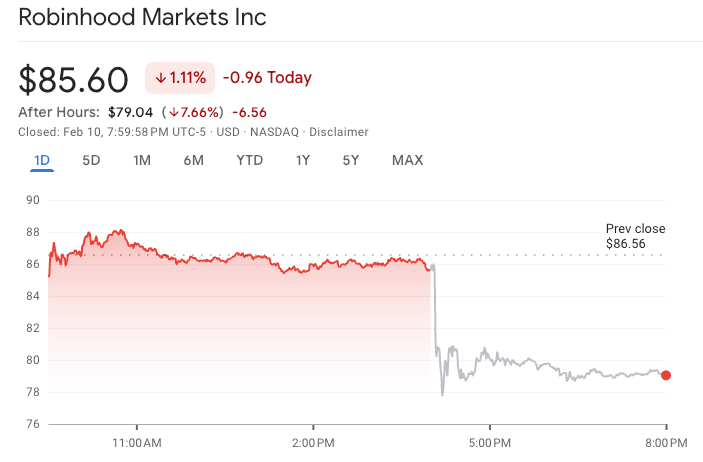
Robinhood dropped in after-hours trading on Tuesday after the trading platform’s latest earnings missed analyst expectations while crypto revenues tanked in the fourth quarter.
Robinhood reported record net revenues of $1.28 billion in Q4, missing Wall Street expectations of $1.34 billion despite increasing 27% year-on-year.
Its crypto-based revenues fell 38% from last year to $221 million after the crypto market entered an extended period of drawdowns in October.
The company’s net income for the quarter fell 34% year-on-year to $605 million, with its earnings per share reaching 66 cents, slightly beating analyst estimates of 63 cents.
Shares in Robinhood (HOOD) fell by 7.66% in after-hours trading to $79.04 after finishing the trading day down 1.1% at $85.60. Its stock is down over 42% since its peak of $148.67 on Oct. 3.

Over the full year, Robinhood said its net revenues for 2025 increased 52% from 2024 to a record $4.5 billion, while its net income for the year jumped 35% to $1.9 billion.
Crypto volume growth lags other products
Robinhood reported that notional crypto volumes across its app and its wholly-owned exchange, Bitstamp, were up 3% quarter-on-quarter in Q4 to a record $82.4 billion.
By comparison, equity trade volumes saw a larger quarterly jump, up 10% to $710 billion, while options contracts traded rose 8% over the quarter to 659 million.
Prediction markets, which the company launched on its platform in March in partnership with Kalshi, have also helped bolster Robinhood’s revenues in Q4, as the appetite for event contracts skyrocketed last year.
Related: Solana treasuries sitting on over $1.5B in paper SOL losses
Robinhood’s “other” transaction-based revenues, which include its products such as prediction markets and futures, hit a record $147 million in Q4, a 375% jump from the same time last year, overtaking its revenues from equity trades for the first time.
Robinhood chair and CEO, Vlad Tenev, said in a statement, “Our vision hasn’t changed: we are building the Financial SuperApp.”
Magazine: 2026 is the year of pragmatic privacy in crypto — Canton, Zcash and more
Crypto World
RWAs shift to institutional reality


Industry leaders discussed demand for tokenized real world assets (RWA) during a Consensus Hong Kong 2026 panel featuring Evan Auyang (group president at Animoca Brands), Christian Rau (senior vice president digital assets and blockchain at Mastercard), Nicola White (VP of crypto institutions, Robinhood), and moderator Marcin Kazmierczak (co-founder, RedStone).
The panel echoed BlackRock COO Rob Goldstein’s bold claim: Digital ledgers are the most exciting development in finance since double-entry bookkeeping 700 years ago.
Today, tokenized real-world assets (RWAs) remain firmly institutional territory. Demand centers on tokenized money market funds, U.S. Treasuries, stablecoin integrations, and collateral optimization products like BlackRock’s BUIDL and offerings from Robinhood/Bitstamp highlight the trend.
Retail participation lags, with few attendees raising hands to confirm holding tokenized RWAs in their wallets. Panelists pointed to Europe’s clear regulations as a launchpad for tokenized listed equities, while private credit, real estate, art, and private equity show strong future potential especially as companies stay private longer and demand for fractional, 24/7 access grows.
The consensus: RWAs have moved from hype to real utility for institutions. The next wave mainstream retail onboarding could unlock trillions in illiquid markets once barriers fall.
Crypto World
Solana president Lily Liu’s bold vision for Solana


In a fireside chat at Consensus Hong Kong 2026, Solana Foundation President Lily Liu unpacked her “Internet Capital Markets” vision with moderator Michael Lau, Chairman of Consensus.
Liu asserted that blockchains’ true strength lies in finance and markets, not utopian general-purpose tech. Liu envisioned tokenizing all world assets on-chain, enabling seamless access from everyday payments to high-frequency trading and creating a unified, global marketplace for capital formation.
Liu traced crypto’s capital-raising evolution from early ICOs to rapid modern raises, arguing this extensible primitive should empower non-crypto projects and companies worldwide. Liu stressed democratising talent and capital formation, which is rare in most markets, as crypto’s core societal impact.
Highlighting Asia’s pivotal role, Liu called it crypto’s “core market,” not frontier, given its Bitcoin origins and vast user/talent base. Liu championed revenue-focused metrics over governance tokens, insisting real network and app usage must drive sustainable value accrual to holders for long-term sovereignty and opportunity.
Crypto World
LayerZero Labs Launching Blockchain Aimed at Institutions


Blockchain company LayerZero Labs is planning to launch its own layer-1 blockchain named “Zero” with backing from ARK Invest and Citadel Securities, and targeting institutional financial markets.
Zero will launch in the fall of 2026, according to an announcement on Tuesday from LayerZero Labs, which also created and maintains the cross-chain messaging protocol LayerZero.
The firm said it will be scalable to two million transactions per second by leveraging zero-knowledge proofs and zero‑knowledge virtual machine Jolt to bypass “the fundamental replication requirement,” which constrains “blockchains to fewer than 10,000 transactions per second.”
LayerZero Labs said Zero will launch with three permissionless environments governed by the underlying network, known as “zones.” It will use the network’s native token and governance asset LayerZero (ZRO) to provide interoperability between zones and across more than 165 blockchains.
Bryan Pellegrino, the CEO of LayerZero Labs, said in a statement that Zero’s “architecture moves the industry’s roadmap forward by at least a decade,” adding: “We believe we can actually bring the entire global economy on-chain with this technology.”
Zero introduces four 100x breakthroughs across storage (QMDB), compute (FAFO), networking (SVID), and zk proving (Jolt Pro).
It lives up to everything we stand for:
– Decentralized
– Permissionless
– Censorship-resistant pic.twitter.com/x5ve1PqAyc— LayerZero (@LayerZero_Core) February 10, 2026
A growing number of financial institutions are moving into crypto as regulations and infrastructure improve, which some predict will bring a new wave of adoption to the space.
Investments from large crypto players
The project has received backing from asset manager ARK Invest, which is becoming a shareholder of LayerZero equity and ZRO, along with market maker Citadel Securities, which has also made a strategic investment in the token.
ARK Invest CEO Cathie Wood will also join Zero’s newly formed advisory board, which includes Michael Blaugrund, vice president of strategic initiatives at the New York Stock Exchange’s parent company, Intercontinental Exchange (ICE), and Caroline Butler, the former head of digital assets at financial services company BNY Mellon.
The investment arm of stablecoin issuer Tether also announced on Tuesday that it had made a strategic investment in LayerZero Labs.
Institutions circling Zero for possible adoption
The project has gained interest from several major institutions, according to LayerZero Labs, which plan to explore the technology for possible use.
Related: LayerZero wins Stargate acquisition in 4-way bidding war
Google Cloud is partnering with LayerZero Labs to explore how AI agents could make micropayments and trade without needing a bank account.
Meanwhile, ICE is looking at Zero for trading and clearing infrastructure to support 24/7 markets and the integration of tokenized collateral. The Depository Trust & Clearing Corporation hopes to use Zero to enhance the scalability of its tokenization service and collateral app chain.
Decentralized trading platform the Global Token Exchange is also planning to build the treasury layer of its decentralized system, Turbo, using Zero, the exchange said in an X post on Tuesday.
Magazine: Bitcoin difficulty plunges, Buterin sells off Ethereum: Hodler’s Digest, Feb. 1 – 7
Crypto World
Ethereum price faces sub-$1,000 risk as liquidity remains lower
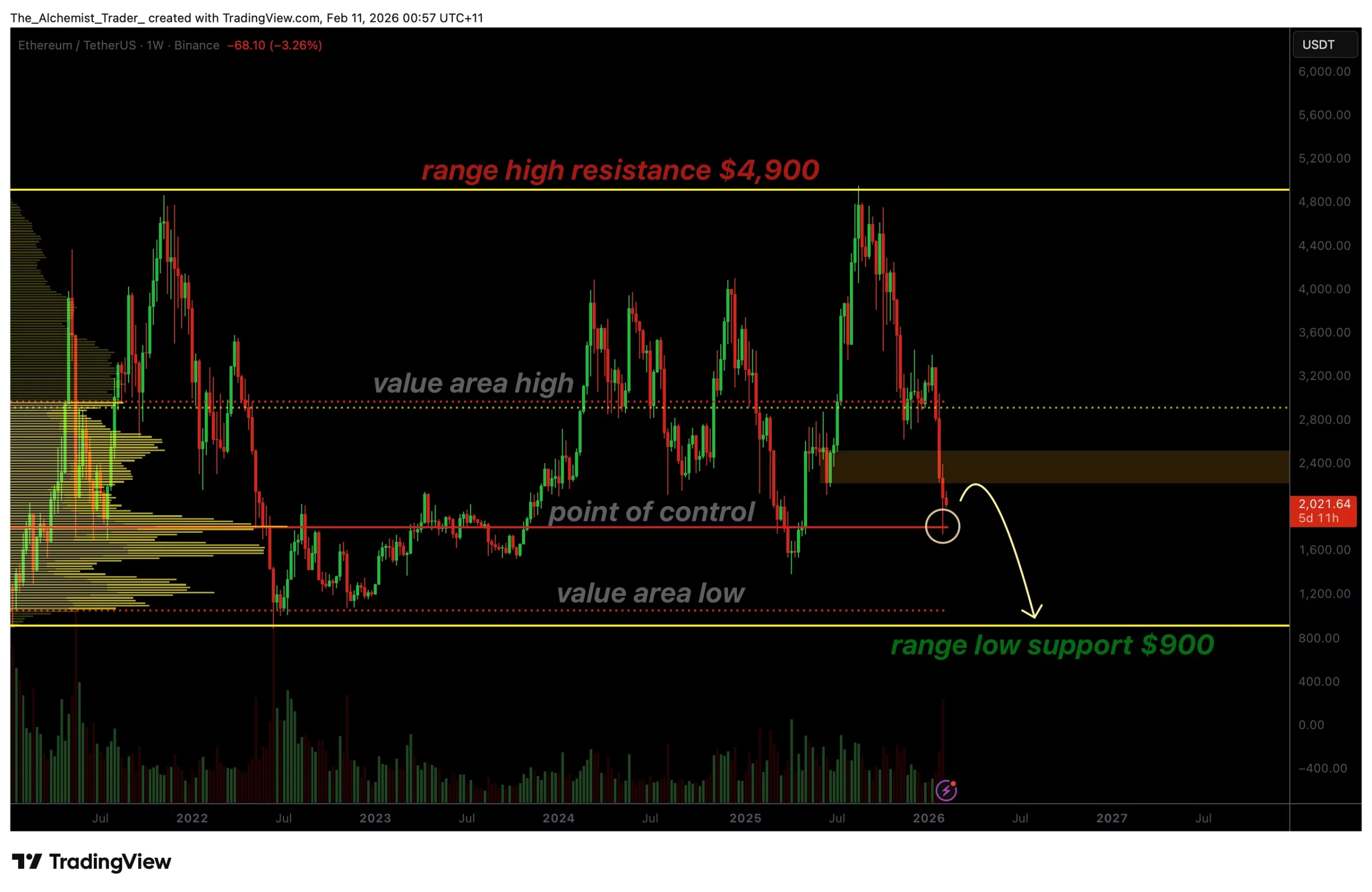
Ethereum price action is showing growing downside risk as weakening liquidity and fragile rebounds increase the probability of a deeper rotation toward the $900 range low.
Summary
- Short-term bounces lack conviction, suggesting rallies may be corrective rather than trend-changing
- Liquidity dynamics favor a downside sweep, with clean lows still attracting price
- Volatility likely to expand, if balance breaks and price seeks deeper acceptance levels
Ethereum (ETH) price continues to trade in a vulnerable position, hovering around a critical support zone known as the point of control (POC). While short-term relief bounces have emerged on lower timeframes, these moves have lacked meaningful bullish follow-through. As a result, Ethereum remains exposed to further downside pressure, particularly as untested liquidity continues to build beneath current price levels.
From a broader market-structure perspective, the ongoing consolidation appears less like accumulation and more like a pause before a continuation. Unless buyers can decisively reclaim control, the risk of a deeper corrective move below $1,000 remains firmly in play.
Ethereum price key technical points
- Ethereum is trading at the point of control, a critical balance level
- Low-volume bounces signal weak demand, raising bull trap risk
- Untapped liquidity sits below range lows, increasing downside probability
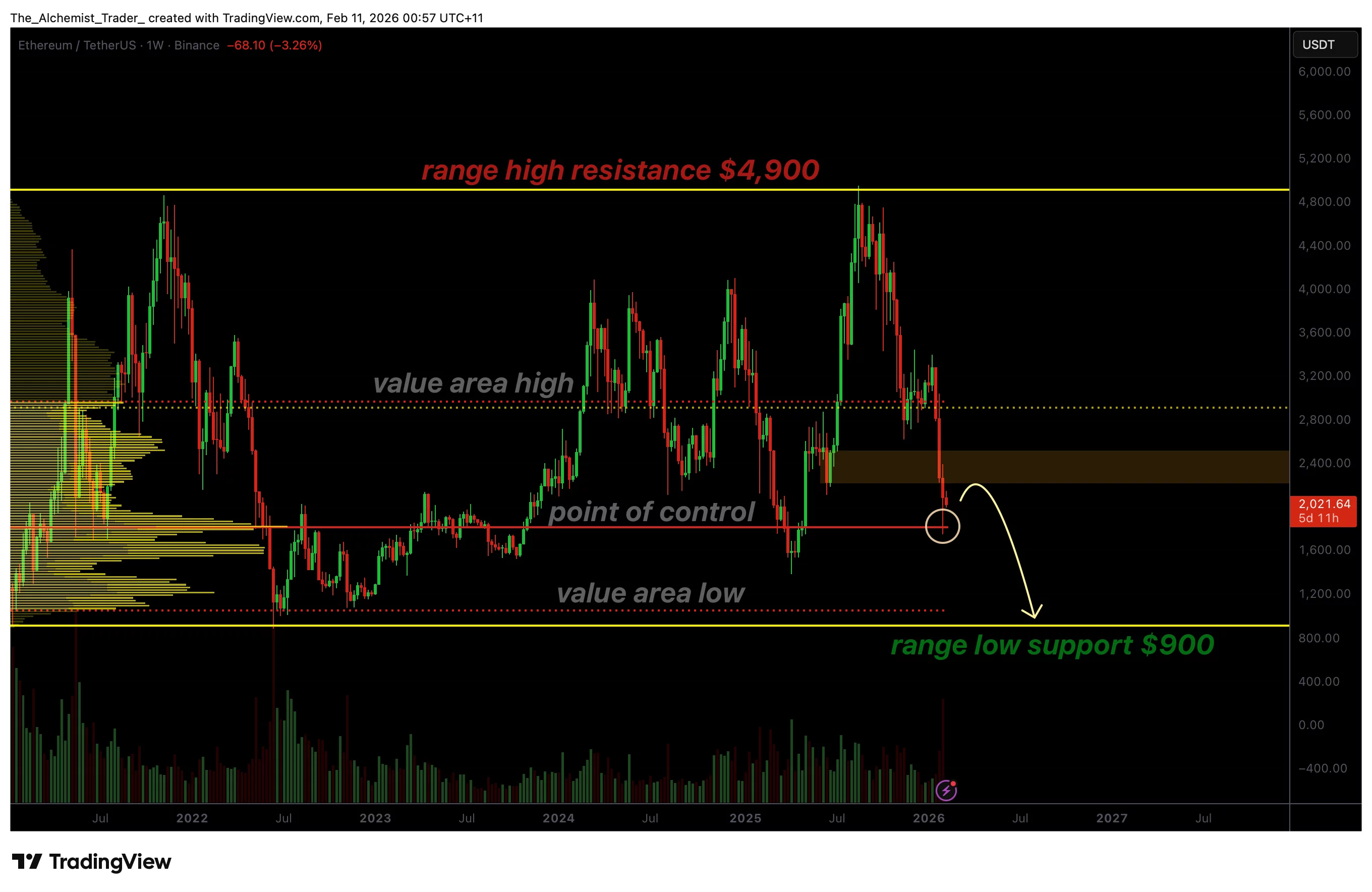
Ethereum’s recent bounce from the point of control has been shallow and short-lived. On the lower timeframes, price has shown temporary stabilization, but these moves have not been supported by strong bullish volume. In trending markets, sustainable reversals typically require expanding participation and aggressive buying, neither of which is currently present.
This type of weak rebound often signals a potential bull trap, in which the price briefly moves higher before rolling over and resuming the dominant trend. As long as Ethereum fails to reclaim higher resistance levels with conviction, short-term rallies remain vulnerable to rejection.
Liquidity below price remains unresolved
One of the most important factors influencing Ethereum’s downside risk is the presence of untouched liquidity beneath current price levels. Clean lows remain intact below the market, suggesting that stop-loss orders and resting sell-side liquidity are concentrated beneath support.
Markets naturally gravitate toward areas of liquidity, particularly during corrective or range-bound conditions. Until this liquidity is addressed, Ethereum remains susceptible to a rotation lower, designed to flush out weak positioning and rebalance the market structure.
Loss of point of control signals expansion risk
The point of control represents the price level at which the most trading activity occurs and often acts as a stabilizing force during consolidation phases. However, once the price loses the POC on a closing basis, it typically signals a shift from balance to imbalance.
If Ethereum decisively loses this level, the probability of an accelerated move increases. In this context, that would likely mean a capitulation-style rotation lower as price seeks the next major area of acceptance. Historically, such moves tend to be swift and volatile, particularly when liquidity below price remains untested.
$900 range low comes into focus
From a high-timeframe perspective, the next major downside target sits near the $900 level. This zone aligns with the value area low and the lower boundary of Ethereum’s broader trading range. Previous interactions with this region have resulted in strong reactions, making it a critical area for potential stabilization or reversal.
A move toward $900 would likely coincide with heightened volatility and emotional selling, characteristics often associated with capitulation events. While such a move may appear bearish in the short term, it could ultimately serve as a necessary reset before a more sustainable base can form.
What to expect in the coming price action
From a technical, price-action, and market-structure perspective, Ethereum remains at risk of trading below $1,000 if current support fails.
The combination of weak bounce attempts, unresolved liquidity, and the potential loss of the point of control favors downside continuation toward the $900 range low.
For this outlook to improve, Ethereum would need to regain control with strong volume confirmation and demonstrate acceptance above higher value areas.
Crypto World
Leading AI Claude Predicts the Price of XRP, Cardano and Ethereum By the End of 2026

Feeding Claude AI carefully structured prompts unlocks explosive price projections for XRP, Cardano, and Ethereum in 2026.
According to Claude, all three could hit fresh ATHs over the next eleven months.
Below we examine whether Claude’s claims are justified by technical signals and the news cycle.
XRP ($XRP): Claude Maps a Long-Term Route Toward $8 by 2027
In a recent blog post, Ripple confirmed XRP ($XRP) remains central to its vision to make the XRPLedger an institutional-grade payments infrastructure.

Already known for lightning fast settlement and negligible costs, XRPL also offers what could be the two biggest use cases in crypto: stablecoins and real world asset tokenization.
Currently trading near $1.43, Claude predicts XRP could climb to $8 by the end of 2026, a nearly 6x increase.
From a technical standpoint, XRP’s Relative Strength Index (RSI) is uptrending from 31, indicating that investors are buying back in after a period of heavy selling rocked the entire market.
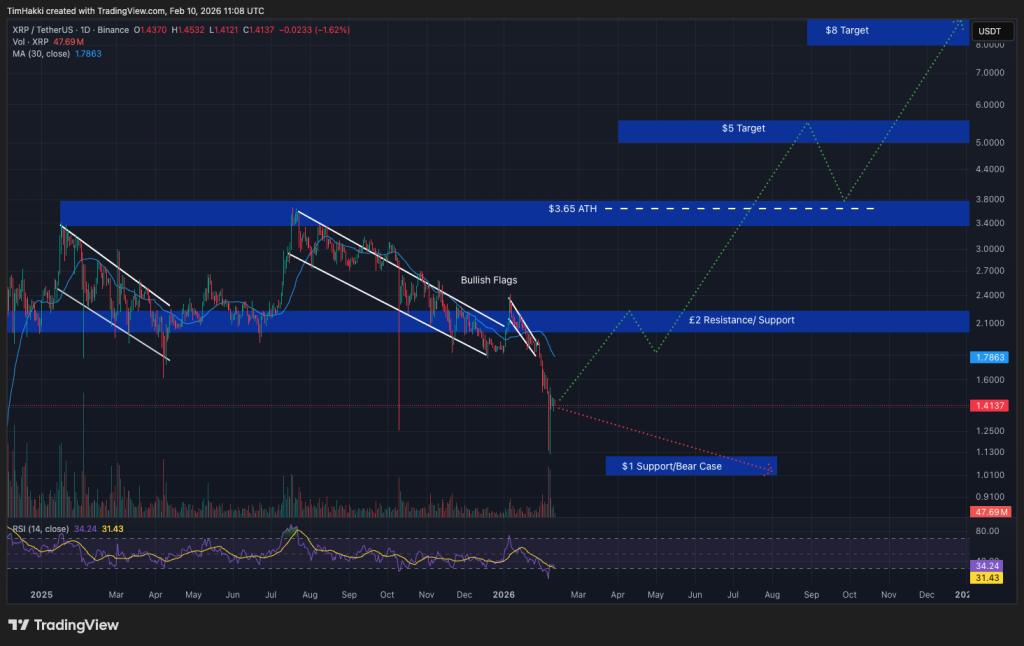
Institutional inflows through newly approved U.S.-based XRP exchange-traded funds, combined with Ripple’s expanding partner network and the potential passage of the U.S. CLARITY bill this year, could even propel XRP beyond Claude’s bull case.
Cardano (ADA): Claude Projects a Potential 1,100% Upside
Created by Ethereum co-founder Charles Hoskinson, Cardano ($ADA) leverages peer-reviewed development, security, scalability, and sustainability.
With a market cap around $10 billion and more than $127 million in TVL Cardano’s growing ecosystem supports its long-term growth.
Claude says ADA could rise over 1,100%, from its current price of $0.26 to $3.25 by Christmas, pushing it comfortably above its 2021 ATH: $3.09.
That said, ADA is currently trading at its lowest level since October 2024. Given the year’s unpredictability so far, another downturn could see ADA slipping the $0.20 to $0.25 support level.
Ethereum ($ETH): Claude Identifies a Possible 5x Setup
Ethereum ($ETH), the world’s leading smart contract platform, underpins most of the DeFi/Web3 infrastructure.
With a market capitalization of around $243 billion and more than $56 billion locked across DeFi protocols, Ethereum remains the primary settlement layer for blockchain commerce.
Its proven security, dominant position in stablecoins, and early leadership in real-world asset tokenization position Ethereum well to capture increased institutional demand.
However, substantial inflows depend on whether U.S. lawmakers approve the CLARITY bill, which will provide the regulatory certainty institutions need to deploy capital on the network, either through stablecoins or tokenized real-world assets.
ETH trades around $2,000, with heavy resistance expected near the $5,000 level after reaching an ATH of $4,946.05 last August.
If Claude’s bullish outlook materializes, a clean breakout above $5,000 could pave the way for multiple new ATHs in 2026, with Claude capping ETH’s growth at a heady $7,500 in a full-scale bull market.
Maxi Doge: Roll Over, Dogecoin! Maxi’s The New Alpha of Memesville!
Finally, while Claude sees XRP, Cardano and Ethereum as relatively safe bets, investors chasing old school crypto upside will want to allocate a small portion of their portfolio to new high-volatility meme coins.
Maxi Doge ($MAXI) is one of the most discussed meme coin presales of 2026 so far, raising $4.6 million before launch.
The project’s mascot is an louche, high-energy parody (and distant cousin) of Dogecoin, blending gym-bro intensity with degen humor to revive the irreverent meme culture that shot Dogecoin and Shiba Inu to stardom.
MAXI is an ERC-20 token on Ethereum’s proof-of-stake network, giving it a smaller environmental footprint compared to Dogecoin’s proof-of-work model.
Presale participants can currently stake MAXI tokens to earn yields of up to 68% APY, with rewards decreasing over time as the staking pool grows.
The token is $0.0002803 in the current presale stage, with automatic price increases triggered at each funding milestone. Purchases are supported via MetaMask and Best Wallet.
Say goodbye to Dogecoin. Maxi Doge is the new alpha in Memesville!
Stay updated through Maxi Doge’s official X and Telegram pages.
Visit the Official Maxi Doge Website Here
The post Leading AI Claude Predicts the Price of XRP, Cardano and Ethereum By the End of 2026 appeared first on Cryptonews.
Crypto World
SkyBridge’s Scaramucci is buying the bitcoin dip, calls Trump a crypto President


SkyBridge Capital’s Founder, Anthony Scaramucci, said Wednesday that he is buying bitcoin amid the falling market, while calling Donald Trump a crypto President.
“So 10 days ago, we were buying Bitcoin at 84,000 last week, you’re buying Bitcoin at 63,000 Bitcoin this week, we’re buyers of Bitcoin in this market, again,” Scaramucci said during a conversation with Bullish’s CEO Tom Farley at Consensus Hong Kong.
He added that buying bitcoin in a downward-trending market is akin to catching a falling knife.
Bitcoin recently crashed to nearly $60,000, after hitting a peak of over $126,000 in October this year. Prices have recovered slightly to $69,000 since then amid signs of capitulation in the bitcoin ETF market.
Scaramucci called President Donald Trump a much better President for crypto than his predecessor, but added that Trump’s geopolitical shenanigans, such as his Greenland ambitions, embolden rival Democrats to oppose him on various policies, including those that affect digital assets.
“I’ll just say to you that, like, the Greenland stuff, believe it or not, is actually tied to the industry. If he does stuff like that, it upsets the opposition to the point where they’re like, You know what? We don’t want him to win on anything, and even if it’s going to spite ourselves and cut our own horses off, we will vote against the crypto bill to hurt Donald Trump,” he explained.
Speaking of Layer 1s, Scaramucci said that programmable blockchain Solana will be one of the biggest market share gatherers.
Crypto World
SafeMoon CEO Given 8-Year Jail Time Over Crypto Scam

Former SafeMoon CEO Braden Karony has been sentenced to 100 months in prison for stealing $9 million from the crypto platform’s liquidity pool in 2021 to fund a “lavish lifestyle.”
The sentence on Monday comes nine months after Karony was convicted by a federal jury on charges of conspiracy to commit securities fraud, wire fraud and money laundering in May 2025.
“Not only did Braden John Karony abuse his position as CEO, but he also betrayed his investors’ trust by stealing more than nine million dollars in digital assets from his company to fund his lavish lifestyle,” FBI assistant director James C. Barnacle, Jr. said.
Karony used the stolen proceeds to purchase a $2.2 million home in Utah, an Audi R8 sports car, a Tesla, a custom Ford F-550 and Jeep Gladiator pickup trucks.
“Karony lied to investors from all walks of life — including military veterans and hard-working Americans,” US Attorney Joseph Nocella, Jr. said, adding:
“Today’s sentence demonstrates that there are significant consequences for financial crimes. Our Office will continue to vigorously prosecute economic crimes that harm investors and weaken societal trust in the stability and security of digital asset markets.”

Karony was ordered to forfeit approximately $7.5 million, the Department of Justice said, while the amount of restitution to the victims will be determined at a later date.
Two SafeMoon execs convicted, one at large
SafeMoon’s former chief technology officer, Thomas Smith, pleaded guilty in February 2025 to conspiracy to commit securities and wire fraud and is awaiting sentencing.
SafeMoon platform’s creator, Kyle Nagy, remains at large, the DOJ added.
Karony is one of many former crypto executives who have now been convicted and sentenced for crimes committed during the 2021-2022 market cycle, when retail market participation was at its peak.
Others who have been convicted include former FTX CEO Sam Bankman-Fried and former Celsius CEO Alex Mashinsky, who are currently serving 25-year and 12-year sentences, respectively.
Related: Crypto PACs secure massive war chests ahead of US midterms
US President Donald Trump said on Jan. 8 that he wouldn’t pardon the former FTX boss, despite having pardoned former Binance CEO Changpeng “CZ” Zhao in October.
Bankman-Fried hasn’t given up, having asked a federal appeals panel for a new trial on Thursday.
Magazine: The critical reason you should never ask ChatGPT for legal advice
Crypto World
Robinhood Launches Public Testnet for Its Ethereum L2 Chain


Robinhood has launched the public testnet for Robinhood Chain, a financial-grade Ethereum Layer-2 built on Arbitrum. Johann Kerbrat, SVP and General Manager of Robinhood Crypto, announced the testnet at Consensus Hong Kong on Wednesday, marking the first public development phase of a chain first teased at the company’s Cannes keynote last year.
In an interview with BeInCrypto in Hong Kong ahead of the announcement, Kerbrat outlined the company’s vision for the chain, including tokenized real-world assets, 24/7 trading, and a $1 million developer hackathon program.
Sponsored
Sponsored
Why Build Its Own Chain
The testnet opens access to network entry points, developer documentation, and full compatibility with standard Ethereum development tools. Ecosystem partners, including Alchemy and LayerZero, are already building on the chain.
The launch comes at a critical moment. Robinhood disclosed $1.28 billion in fourth-quarter revenue on Tuesday, missing analyst expectations of $1.35 billion. Crypto transaction revenue fell to $221 million from $268 million the previous quarter as Bitcoin dropped 23% during the period. The company’s stock has slid from an all-time high of $154 in October amid the broader crypto downturn.
Robinhood first brought tokenized US equities to EU customers in July 2025 through a partnership with Arbitrum, offering commission-free tokens linked to more than 200 US stocks and ETFs. The product now covers over 1,000 stock tokens across the EU and EEA. But the company always intended to migrate to its own chain.
“It was a two-step process from the beginning. Arbitrum’s technology allows you to launch first on Arbitrum One and then migrate to your own proprietary chain,” Kerbrat told BeInCrypto.
The central motivation is customization. General-purpose Layer 2 networks handle compliance at the smart contract level, but Robinhood Chain embeds regulatory requirements directly into the chain layer. This distinction matters for tokenized securities, where minting and burning stock tokens must comply with different rules across jurisdictions.
The chain itself remains permissionless — anyone can build on it — but the products Robinhood develops on top are designed specifically for regulated financial services.
From Stock Tokens to Real-World Assets
Tokenized public equities were the starting point, but Robinhood’s ambitions extend well beyond listed stocks. Kerbrat said the company’s tokenization engine is designed to eventually support private equity, real estate, art, and other real-world assets.
Sponsored
Sponsored
A key part of the value proposition is expanding trading hours. Robinhood’s stock tokens currently trade 24 hours a day, five days a week. The migration to Robinhood Chain is expected to enable 24/7 trading — removing the remaining gaps tied to traditional market schedules.
Instant settlement and self-custody are also on the roadmap, along with integration with liquidity pools and lending protocols. Together, these features represent a significant upgrade from the current tokenized stock product, which relies on Arbitrum One infrastructure.
Developer Ecosystem and DeFi Focus
In the near term, Robinhood is focused on attracting developers to build decentralized exchanges, perpetual trading platforms, and lending protocols on the chain. These are natural extensions of its existing brokerage and crypto products.
To jumpstart the ecosystem, the company is planning a series of hackathons across multiple geographies with a total prize pool of $1 million. Kerbrat said the focus will be squarely on financial applications.
Sponsored
Sponsored
Asia-Pacific Expansion
The testnet launch at Consensus Hong Kong coincides with Robinhood’s deepening push into the Asia-Pacific region. Robinhood completed its $200 million acquisition of Bitstamp in June 2025, gaining access to the exchange’s more than 50 active licenses and registrations worldwide, as well as its institutional crypto-as-a-service business.
Kerbrat said the event provided an opportunity to meet Bitstamp’s Singapore-based clients in person. Through the acquisition, Robinhood now holds licenses in Singapore and Indonesia. It also acquired two smaller Indonesian companies to build a local presence.
Indonesia, with roughly 13 million crypto users, is a priority market. Kerbrat said early conversations with Indonesian regulators have been positive, with discussions centering on AML compliance and risk disclosures rather than resistance to the company’s entry.
Robinhood’s regulatory track record — spanning FINRA, New York DFS, MiCA in the EU, and MAS in Singapore — gives the company confidence in navigating different jurisdictions, Kerbrat said.
Diversifying the Revenue Model
The Q4 earnings miss underscores a persistent concern: Robinhood’s heavy reliance on transaction-based revenue, particularly from crypto trading. The company is working to diversify on multiple fronts.
Sponsored
Sponsored
Staking, launched in the US in 2025, has reached approximately $1 billion in staked assets. The Robinhood Chain itself is intended to generate new forms of infrastructure-driven revenue over time.
On the trading side, Robinhood has invested in advanced tools to attract high-frequency and high-volume traders — a segment that provides a more stable revenue baseline even in softer markets, according to Kerbrat. The company also expanded its fee tiers from three to seven, with rates as low as 0.03% for high-volume traders.
The institutional channel is also growing. Bitstamp’s crypto-as-a-service offering lets banks, hedge funds, and family offices provide their clients with access to crypto. Kerbrat noted that institutions tend to enter the market during downturns, providing a countercyclical buffer.
Meanwhile, prediction markets have emerged as a bright spot. CEO Vlad Tenev said at a company event in December that prediction markets are Robinhood’s “fastest-growing product line by revenue ever,” with 11 billion contracts traded by more than one million customers.
What’s Next
The public testnet is the first phase of a multi-step rollout. Robinhood plans to migrate its existing stock token products to the chain before eventually transitioning to the mainnet. No specific timeline for the mainnet launch has been disclosed.
“Our vision hasn’t changed: we are building the financial superapp,” Tenev said in the company’s Q4 earnings statement.
-

 Tech7 days ago
Tech7 days agoWikipedia volunteers spent years cataloging AI tells. Now there’s a plugin to avoid them.
-

 Politics2 days ago
Politics2 days agoWhy Israel is blocking foreign journalists from entering
-

 NewsBeat1 day ago
NewsBeat1 day agoMia Brookes misses out on Winter Olympics medal in snowboard big air
-

 Sports4 days ago
Sports4 days agoJD Vance booed as Team USA enters Winter Olympics opening ceremony
-

 Tech4 days ago
Tech4 days agoFirst multi-coronavirus vaccine enters human testing, built on UW Medicine technology
-
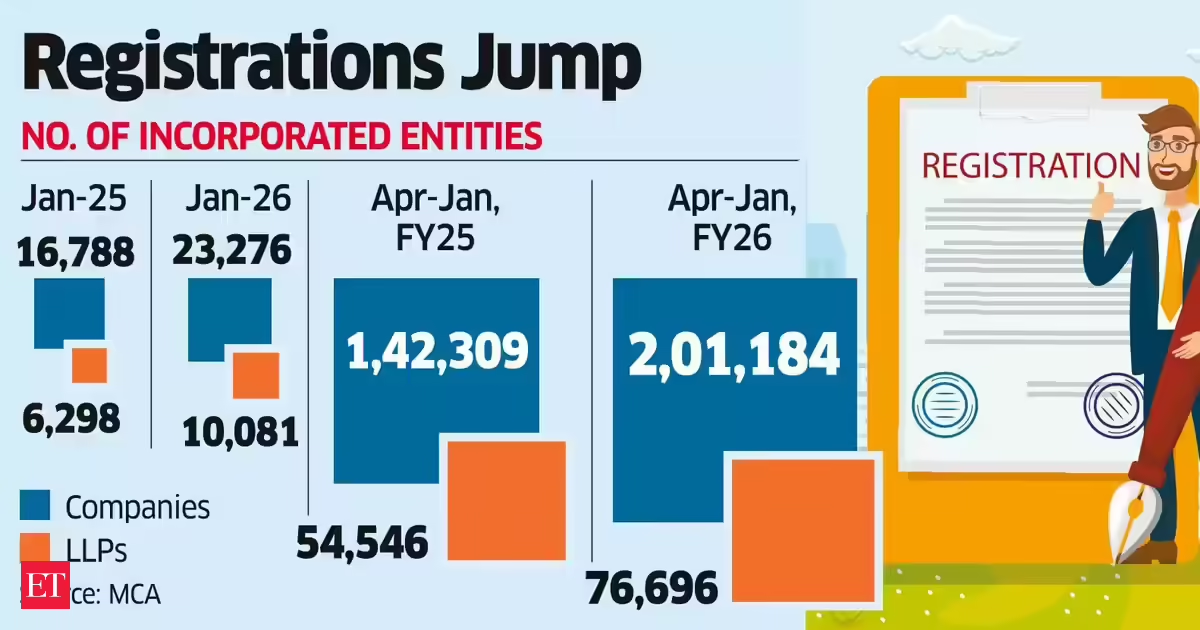
 Business2 days ago
Business2 days agoLLP registrations cross 10,000 mark for first time in Jan
-

 NewsBeat2 days ago
NewsBeat2 days agoWinter Olympics 2026: Team GB’s Mia Brookes through to snowboard big air final, and curling pair beat Italy
-

 Sports2 days ago
Sports2 days agoBenjamin Karl strips clothes celebrating snowboard gold medal at Olympics
-
Sports4 days ago
Former Viking Enters Hall of Fame
-

 Politics2 days ago
Politics2 days agoThe Health Dangers Of Browning Your Food
-
Sports5 days ago
New and Huge Defender Enter Vikings’ Mock Draft Orbit
-

 Business3 days ago
Business3 days agoJulius Baer CEO calls for Swiss public register of rogue bankers to protect reputation
-

 NewsBeat5 days ago
NewsBeat5 days agoSavannah Guthrie’s mother’s blood was found on porch of home, police confirm as search enters sixth day: Live
-

 Business5 days ago
Business5 days agoQuiz enters administration for third time
-

 Crypto World11 hours ago
Crypto World11 hours agoBlockchain.com wins UK registration nearly four years after abandoning FCA process
-

 Crypto World20 hours ago
Crypto World20 hours agoU.S. BTC ETFs register back-to-back inflows for first time in a month
-

 NewsBeat2 days ago
NewsBeat2 days agoResidents say city high street with ‘boarded up’ shops ‘could be better’
-
Sports1 day ago
Kirk Cousins Officially Enters the Vikings’ Offseason Puzzle
-
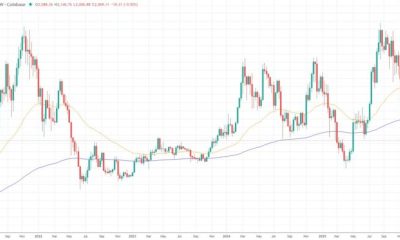
 Crypto World19 hours ago
Crypto World19 hours agoEthereum Enters Capitulation Zone as MVRV Turns Negative: Bottom Near?
-

 NewsBeat6 days ago
NewsBeat6 days agoStill time to enter Bolton News’ Best Hairdresser 2026 competition







